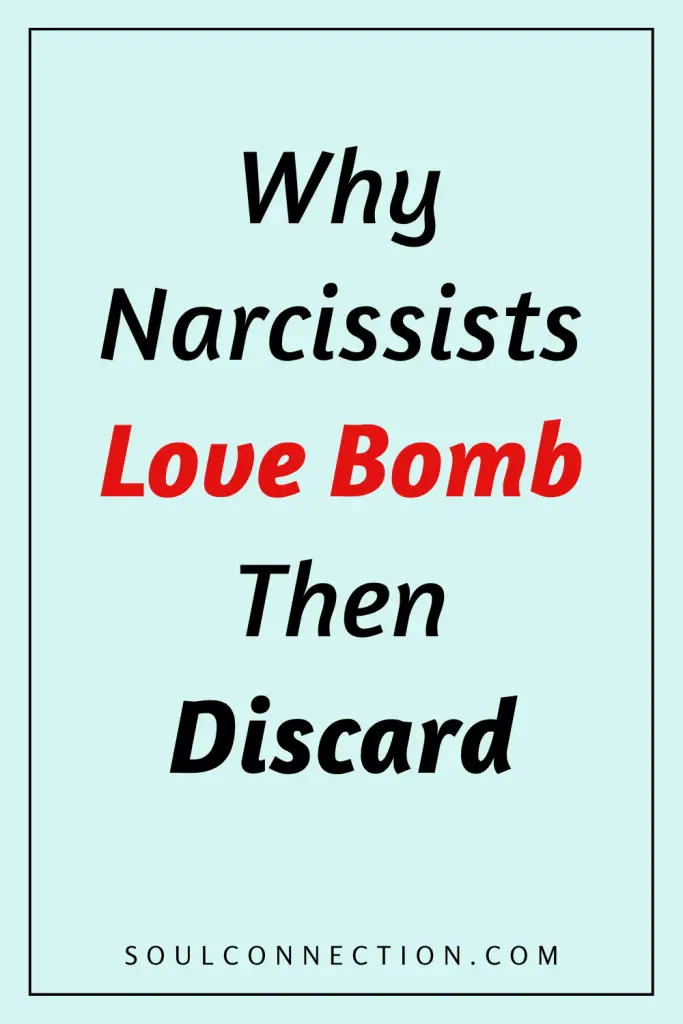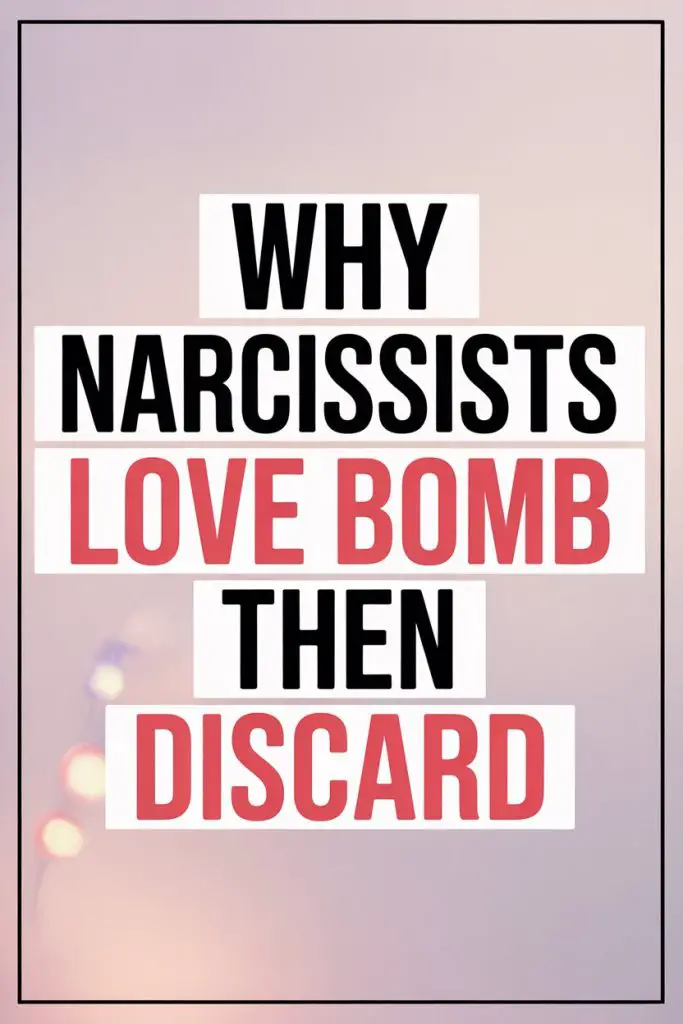Love bombing: it sounds lovely. Like a Hallmark holiday crossed with a glitter cannon. But anyone who’s been swept off their feet by a narcissist knows it’s less “happily ever after” and more “emotional whiplash.”
One minute you’re the centre of their universe, the next you’re left replaying every message, convinced you must have missed a memo.
What’s really behind this cycle of love bombing and sudden discard? Why do narcissists jump from head-over-heels to cold-shoulder with such breathtaking speed?
Time to pull back the curtain and shed light on this head-spinning pattern.
The Love Bombing Phase Why It Feels So Good
Ah, the honeymoon period—with a twist. Love bombing from a narcissist feels like being cast as the romantic lead in your own blockbuster.
Flowers, grand gestures, texts so sweet you check for cavities. Compliments rain down.
Every story you tell is met with rapt attention. You’re dazzling, hilarious, the most interesting human on the planet.
This isn’t normal early relationship giddiness dialed up a notch. Narcissists turn the volume up to eleven. It’s not about you so much as it is about them—and how quickly they can draw you in.
It’s a calculated routine, designed to make you trust them and pin your happiness on their affection.
Your excitement is very real. Their motivation, less so.
Why Narcissists Pour It On So Thick
Narcissists thrive on admiration and adoration. To them, relationships are not heartfelt partnerships but sources of “supply”—a technical term for the attention, praise, and validation they desperately crave.
They’re not looking for equals; they’re hunting for someone to orbit around them, fueling their self-worth.
Love bombing is the quickest way to establish this dynamic. If you’re head-over-heels, you’re more likely to ignore red flags, silence your gut feelings, and forgive slights.
The narcissist’s goal? To lock you in with a rush of dopamine before you spot the cracks in their glittering façade.
It’s less about genuine romance and more about securing a reliable source of ego-stroking.
The Mask Always Slips
Once the narcissist senses you’re hooked, things start to shift. Maybe the compliments dry up. Your texts suddenly go unanswered.
The person who once hung on your every word now seems bored, irritable, or even contemptuous. You’re left wondering if you said something wrong, if their feelings have changed overnight, or if you just imagined the whole thing.
Spoiler: you didn’t. This is classic narcissist behavior. The “mask” of adoration they wore at the start simply can’t hold.
Real intimacy—where two people see each other’s flaws and love each other anyway—isn’t something narcissists can stomach for long. Vulnerability feels like a threat to their carefully constructed self-image.
The moment the chase is over, the thrill dissipates.
Why Discarding Feels So Brutal
When the discard phase arrives, it’s rarely gentle. Some narcissists ghost. Others pick fights, criticize, or accuse you of being “too much.”
The goal is to keep you off balance. If you’re busy blaming yourself, you won’t look too closely at their behavior—or question the reality they’ve built.
The abrupt loss of affection is confusing and painful. You may find yourself replaying every conversation, convinced you could have done something differently to “keep” the love bombing going.
That’s exactly what the narcissist wants: for you to chase them, doubling down on efforts to win back their attention.
Meanwhile, they move on to find a new source of supply, rinse and repeat.
The Psychological Payoff for Narcissists
This love bomb-discard cycle isn’t random. Narcissists are running a script. The love bombing phase gives them a rush of power.
They watch as you light up at their attention, as you fall for the carefully constructed persona they present.
Then, by pulling away, they prove to themselves that they’re in control. If you beg, plead, or try to “fix” things, all the better—it feeds their sense of superiority.
You’re no longer an equal partner; you’re a character in their drama, reacting to their cues.
It’s a twisted sort of emotional puppeteering, driven by insecurity and a need for dominance.
Why Does It Always End the Same Way
Every time, the narcissist’s story follows a familiar arc: love bomb, hook, devalue, discard. It’s not about you being unworthy or doing something wrong. The pattern exists because narcissists can’t maintain real connection.
Intimacy requires empathy, humility, and a willingness to be seen, warts and all. Narcissists prefer fantasy to reality—they want partners who worship them, not challenge them.
Once real-life needs, emotions, or boundaries enter the picture, the narcissist’s interest evaporates. They either move on or turn cold, repeating the pattern with someone new.
How to Spot the Cycle Sooner
Nobody wants to feel foolish for falling for love bombing, but narcissists are masterful charmers. The sooner you recognize the signs, the easier it is to step back and protect yourself.
Watch for relationships that move at lightning speed—where “I love you” arrives before you’ve finished your chips.
Big declarations, constant attention, and a sense that you’re being swept along without time to breathe are all red flags. Real intimacy takes time to build.
If compliments are over-the-top or if the other person seems to mirror your interests, values, or experiences a little too perfectly—it’s worth questioning. Are you being genuinely seen, or are you being flattered into submission?
Why It’s Not Your Fault
Shame loves to creep in after a discard: “Why did I fall for this? What’s wrong with me?” Here’s the truth—most people crave connection, and narcissists know how to mimic it with alarming skill.
Their techniques are rehearsed, well-worn, and expertly deployed.
Nobody is immune to clever manipulation, especially when it masquerades as romance. Blaming yourself only compounds the harm. Compassion—especially for yourself—is the antidote.
Practical Steps You Can Take Tonight
Got a sneaking suspicion you’ve landed in the orbit of a love bomber? It’s time to set some boundaries—starting now.
Pause before responding to over-the-top gestures. If the pace feels relentless, slow things down. Suggest meeting up less often or taking more time between texts.
Watch how the other person reacts: a thoughtful partner will respect your comfort zone, while a narcissist will likely pressure you or guilt-trip you.
Trust your gut. If you feel uneasy, confused, or pressured, those are valid feelings, not just “jitters.” Keep friends and family in the loop—they can often spot red flags you might miss.
And if you’ve just been discarded? Resist the urge to chase. Block, mute, or delete as needed. Protecting your peace is far more satisfying than any apology a narcissist could offer.
Healing After the Discard
Rebuilding after a narcissist’s discard can feel like untangling last year’s Christmas lights—frustrating and a bit hopeless. But healing is possible, even if the road is bumpy.
Start with self-compassion. Reconnect with hobbies, friends, and routines that remind you who you are outside of relationships.
Therapy can be a lifeline, especially with someone who understands narcissistic abuse.
Give yourself plenty of time. Narcissists leave emotional bruises, but they do fade. Every step away from the drama is a step toward clarity and calm.
Reclaiming Your Power
Getting wise to the love bomb-discard cycle doesn’t mean you’ll never be swept off your feet again—but the next time someone comes on strong, you’ll know what questions to ask.
No, you’re not “too much.” No, you don’t “need to work harder” to keep someone’s affection.
Real love doesn’t rely on performance or perfection. It grows steadily—sometimes quietly, sometimes with fireworks, but always with respect.
Keep your wits about you, your sense of humor intact, and your phone number out of the hands of anyone who thinks “love” means a three-week audition followed by a vanishing act.
You deserve the sort of love that sticks around for the sequel. And if anyone tries to convince you otherwise, you know where the “block” button lives.


